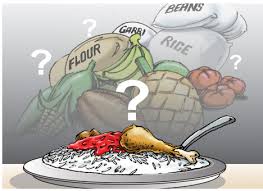Nigeria, Africa’s most populous nation, faces a dire challenge: hunger and malnutrition are running rampant, while the government debates the creation of new states. Amid proposals to carve out 31 new states as reported by Prime Business Africa, the financial implications of such moves raise questions about national priorities.
The creation of new states, often seen as a means to decentralise governance and promote regional development, comes at a heavy cost. This feature explores the financial burdens of creating new states and contrasts it with what could be achieved if those funds were redirected to address pressing issues like agriculture, food security, and poverty alleviation.
Join our WhatsApp ChannelNigeria’s current food crisis is alarming. Over 33 million Nigerians are facing food insecurity, with a disturbing 2.5 million children severely malnourished, according to the UN Office on Humanitarian Affairs. In addition to the devastating impact of inflation on food prices, which have made basic items like rice, beans, and vegetables unaffordable for millions, Nigeria’s agricultural sector is under severe strain. Terrorism, herders’ violence, and inadequate infrastructure have caused farmers in the food-producing regions to abandon their farms. In fact, Nigeria’s reliance on food imports has reached unsustainable levels, contributing to a massive $16 billion annual food import bill.
In the face of such urgent problems, the Federal Government has proposed creating new states, which many critics argue is a misallocation of resources. This article will break down the financial implications of creating new states, comparing this with what could be accomplished by investing those funds in agricultural programmes, poverty alleviation efforts, and improving food security across the country.
The Proposal for New States: A Distraction from Hunger?
The proposal to create 31 new states, announced by the House of Representatives Committee on Constitution Review, has sparked widespread debate across Nigeria. Six new states are proposed for the North Central, four for the North East, five for the North West, five for the South East, four for the South-South, and seven for the South West. These new states include regions like Okun, Okura, and Confluence from Kogi, as well as new entities like Amana in Adamawa, and Muri State in Taraba.
Proponents argue that new states will bring governance closer to the people, improve administration, and foster regional development. However, critics argue that this plan is a misguided use of public funds, especially given the pressing issues of food insecurity and poverty affecting millions of Nigerians. The costs of creating new states, including administrative expenses, infrastructure development, and the establishment of new governance structures, could be better spent on improving food production and alleviating hunger.
“I think the government should focus on solving the hunger crisis before creating new states. What will new states do if there is no food to eat?” said Adeola Olumide, a concerned Nigerian from Lagos.
This sentiment was echoed by others who questioned whether state creation would truly lead to improved governance.
READ ALSO: Nigerian Lawmakers Propose Creation Of 31 New States
Redirecting Funds to Agriculture and Food Security
The current state of agriculture in Nigeria is woeful, and it contributes significantly to the country’s food insecurity. At 24 percent, agriculture is the highest contributor to Nigeria’s GDP. Despite this, the sector remains underfunded and faces several challenges. Farmers are hindered by poor rural roads, high transport costs, lack of mechanized farming tools, and inadequate storage facilities. Additionally, security threats, particularly from terrorists and Fulani herdsmen, force farmers to abandon their land.
Experts agree that if the government were to reallocate funds from state creation to agriculture, the impact could be transformative. Dr. Adaobi Okafor, an agricultural expert, said, “The money spent on creating new states could be better invested in improving agricultural infrastructure and incentivising farmers to increase production. If Nigeria were to boost its local production, the cost of food would decrease, and the country would be able to export surplus food.”
One of the critical issues facing Nigeria is its reliance on food imports, which cost the country $16 billion annually. As the country grapples with the devaluation of the naira, these imports become increasingly unaffordable. The situation is further compounded by inflation, which has led to skyrocketing prices for staples such as rice, beans, and eggs.
“We need to prioritise local production. We have arable land in abundance, and if the government invests in agriculture, we can feed our people and even export food,” said Professor Ibrahim Bello, an economist.
Malnutrition and Hunger: A National Emergency
Malnutrition rates in Nigeria are reaching crisis levels. In 2023, the Minister of Women Affairs, Imaan Sulaiman-Ibrahim, highlighted the 32 percent rise in malnutrition among children under five. She attributed the situation to several factors, including economic pressures, forced migration, and the breakdown of family structures. The WorldFood Programme has warned that as many as 26.5 million Nigerians could face severe hunger in the coming months.

“We are witnessing a disaster,” said Trond Jesen of the UN Office for Coordination of Humanitarian Affairs (UNOCHA). “The rising food prices and continuous flooding have pushed millions into deeper hunger, with children being the hardest hit.”
Despite these warnings, the government has failed to implement effective responses, leaving the population vulnerable to hunger and malnutrition. This lack of action raises the question: should Nigeria be focusing on feeding its people rather than dividing its territories?
The Financial Costs of New States vs. Agricultural Investments
The cost of creating new states is not insignificant. Each new state requires notable investments in infrastructure, administration, and governance structures. The creation of a state entails building new roads, offices, and providing salaries for civil servants and government officials. The total financial burden could run into billions of dollars, money that could be better used to strengthen agricultural programmes, improve food distribution, and provide financial support to farmers.
By contrast, redirecting this funding to agriculture could potentially increase food production, reduce food imports, and create job opportunities for millions of Nigerians. Farmers would benefit from improved roads, better access to tools, and enhanced security. Additionally, a robust agricultural sector could increase Nigeria’s food exports, improving the country’s balance of payments.
“I think the funds for state creation should go into programs that tackle food insecurity,” said Sarah Udeh, a Nigerian from Benue State. “If they invest in agriculture, we can produce enough food locally.”
The debate over the creation of new states in Nigeria comes at a time when the country is facing an unprecedented food crisis. While new states may seem like a way to address regional concerns, the financial implications of such a move are too great to ignore. Redirecting these funds into agricultural development and food security programmes could offer a more immediate and tangible solution to Nigeria’s hunger crisis. As the country’s population continues to grow and its food insecurity deepens, it is clear that feeding the nation must take priority over creating new political entities.
Emmanuel Ochayi is a journalist. He is a graduate of the University of Lagos, School of first choice and the nations pride. Emmanuel is keen on exploring writing angles in different areas, including Business, climate change, politics, Education, and others.
















